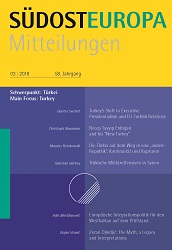Turkey’s Shift to Executive Presidentialism
Turkey’s Shift to Executive Presidentialism
How to Save EU-Turkish Relations
Author(s): Günter SeufertSubject(s): Government/Political systems
Published by: Südosteuropa Gesellschaft e.V.
Keywords: Turkey;democracy;EU;Presidentialism;Recep Tayip Erdogan
Summary/Abstract: The most recent report of the European Commission on Turkey from 17 April 2018 points out that, for the time given, there is no room for the opening of new EU negotiation chapters. After 13 years of protracted bargaining, mutual crimination, backtracking of democracy and the rule of law in Turkey as well as a serious loss of prestige and leverage on the side of the EU, relations between Ankara and Brussels are at an all-time low. Undermining the separation of powers and the independency of the judiciary, Turkey’s shift to executive presidentialism may well push both sides further apart. However, the EU still matters for Turkey economically and the EU depends on Turkey in the realm of security policy where highly sensitive issues are at stake such as migration, the fight against terrorism and Turkey’s membership in NATO. To secure a working relationship, both Turkey and the EU have to shoulder responsibility for the failing accession process. Turkey needs to fix a number of arrangements of its presidential system most detrimental to democracy. For its part, the EU has to create a new framework for relations of its members with Ankara. A framework is needed that is both attractive for Turkey in terms of economy and challenging regarding the rule of law.
Journal: Südosteuropa Mitteilungen
- Issue Year: 2018
- Issue No: 03
- Page Range: 06-19
- Page Count: 14
- Language: English
- Content File-PDF

